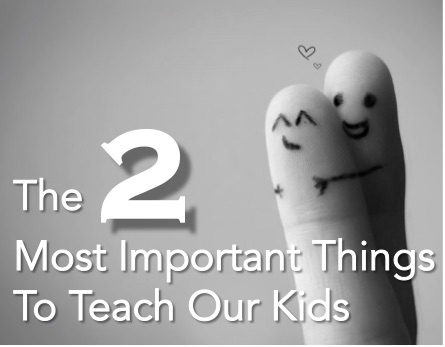The Two Most Important Things To Teach Our Kids
/ I was lying in bed a couple weeks ago when it happened.
I was lying in bed a couple weeks ago when it happened.
“$#!^!”
I tried to reel it back in, but the expletive was out of my mouth. I sat bolt upright, pulling the covers off my wife. She put down her book and looked at me like I was a crazy person.
“What is wrong with you?!” she asked.
Panicked, I said, “We only have six days left, and we haven't done enough!”
Somehow, in my twilight sleep, my mind flashed back to an article she read when our kids were infants. It stated that parents are the chief architects of a child’s moral compass through age 8. After that, kids begin to question the infallibility of adults in their lives and look to their peers for guidance. Even if those peers are throwing bricks off an overpass and snorting cinnamon.
So, with my son’s 9th birthday fast approaching, a sense of doubt washed over me. If you’re a parent, you’ve probably felt it, too. Silently wondering if you’re doing it right, but knowing deep down that you haven’t done enough.
The next day, I Googled “top things to teach your kids” to find out just how much I had failed. One article listed five things of critical importance. Another had twenty-seven. One even listed 100 things. It was completely overwhelming. Especially considering I still haven’t been able to teach my kids to chew with their mouths closed or apologize for farting in my lap.
However, just before my downward spiral hit rock bottom, something miraculous happened. A still, small voice in my soul broke through the malaise and said:
Just because something is hard doesn’t mean it has to be complicated.
And that voice is absolutely correct. Our problem as parents is not that we don’t have enough information - it’s that we have too much. Parenting today is like being trapped in a dryer full of “should have’s” and an “ought to’s”. The chaos spins all around us, but there isn’t a single thing we can hold onto for assurance.
In an effort to simplify parenting and get back what’s truly important, I dove into the research looking for common themes. And while there may be countless lessons we must teach our kids, I discovered two that stood out above all the rest. Two simple things that have the greatest chance of creating the society we all crave, filled with happy, productive adults that we don’t want to punch in the throat.
<><><>
#1: Courage
In the age of helicopter parenting, raising courageous kids can be difficult. As the television fills our heads with fear of kidnappings and sexual predators, we grow ever more protective. We teach about stranger danger and conduct our surveillance from the cradle to the college campus using every device imaginable.
But here’s what has me scratching my head. There has never been a safer time to be a kid in America. A recent Washington Post article points out that mortality rates have fallen by nearly half since 1990. Reports of missing persons are down by 40% since 1997. Before you say, “that’s probably because we’re now watching our kids all the time!” note that 96% of missing persons cases are runaways.
So, not only is our over-parenting unnecessary, it’s also counter-productive. Our well-intentioned protection is actually creating a society of fearful, dependent adults.
Surveys show roughly one-third of professional employers today report parents submitting resumes on behalf of their child. One-quarter say a parent has called to advocate for their child being hired. And nearly one-in-ten accompany their child to the interview.
As parents, we must reverse this trend. We must give our children the courage to face adversity on their own.
Make no mistake, courage is not confidence. Kids today are more confident than ever. Even when there is no justified reason. Courage, on the other hand, comes from the latin word, “cor”, meaning “heart.” Courage is defined as “the ability to do something that frightens you,” or “strength in the face of pain or grief.”
And this is what our kids need.
Because one thing is certain in this life. Our children will fail. No matter how smart, confident or hard working they may be. But studies show that kids who are most likely to achieve their goals are those who find their true passion and doggedly pursue it. But it’s important to note that these passions are not painted on by a parent from the outside. No, they bubble up from within. And they become so all-consuming that the child can’t help but find joy in the pursuit itself, no matter the outcome.
Instilling such courage in our kids requires that we parent at arm’s length. Or farther. Offering autonomy, support, and en-courage-ment. So our kids can become who God made them to be.
In His image.
Not ours.
Yes, this is the courage we must teach. But it’s not enough.
<><><>
#2: Compassion
Like me, you likely feel that you do a good job of encouraging your kids without pushing too hard. You cheer them on, teaching the value of working hard to achieve a goal. The question becomes: how might our kids interpret all of this encouragement?
The Make Caring Common project at Harvard University recently surveyed 10,000 kids. What they found is both interesting and convicting.
Nearly 80 percent of the youth in the study said their parents were more concerned with their achievement or happiness than whether they cared for others. The interviewees were also three times more likely to agree that “My parents are prouder if I get good grades than if I’m a caring community member in class and school.”
Ouch.
Unfortunately, this is the result when we emphasize our kids’ courageous accomplishments in hopes of reinforcing effort and building self-esteem. They interpret this intense focus on achievement as an indicator of what is important in life.
But Brad Bushman, a research psychologist at Ohio State University, cautions that how we praise our children has a huge impact not only on what they believe is most important, but who is most important. His research found that overvaluing your child’s accomplishments, especially telling them how “smart” or how “special” they are, can lead to narcissism.
And this is how courage gets corrupted.
While self-esteem is believing your worth is equal to anyone else’s, narcissism is believing you are better than everyone else. And this can be very damaging character trait. Jean Twenge, who studies narcissism, notes that narcissists tend to lack empathy and have trouble maintaining relationships.
So why does this matter?
In the end, we all just want our children to be happy, right? But virtually every research paper written about happiness shows that the two biggest building blocks for sustained joy (besides health) are 1) having meaningful relationships, and 2) serving others. That’s right. These two trump money, trophies, and trips to the beach. Every. Single. Time. But all the courage in the world won’t give you strong relationships and a servant’s heart. It takes compassion.
Compassion comes from the Latin word meaning “to suffer with.” Compassion starts with sympathy - the ability to understand a person’s circumstances. And this sympathy grows into empathy - the ability to truly feel what another person is feeling. Even if they are suffering.
And compassion?
Compassion is empathy with action.
Compassion is how relationships are built and maintained. Friendships. Teams. Marriages. Compassion is about paying attention to the quiet voices of those on the margins. Hearing them. Feeling them. And then acting as though the interests of others are just as important as your own. Even when society and the scoreboard tell you something different.
Yes, we must teach our children to have compassion like this. And this type of compassion requires courage. The two go hand-in-hand.
Courage and compassion.
Inseparable.
<><><>
As I write these words, my oldest child is now 9 years old. There is already evidence that my influence is waning. We share fewer hugs in the school drop off line. His taste in music is becoming his own. Heck, he’s even spouting slang that I don’t understand.
Still, I refuse to believe that my time is up.
Amid the slamming doors and silent dinners to come, I’m sure there will be times I’ll feel like a failure. In those moments, my head will likely become a spin cycle of “should have’s” and “ought to’s”. But in those moments, my prayer is that I can be a father who has courage enough to show love without condition and compassion enough to see them for who they are. The ones I have raised. The ones I love. The courageous, compassionate children of God.
And in the end, that will always be enough.
* Enjoy this post? For more, just preorder Scott's book about his family's Year Without A Purchase on Barnes & Noble or Amazon launching August 4th from WJK Press. And, to see more posts like this, submit your email at the upper right to receive new blogs hot n fresh to your inbox. Or, Like us on Facebook.

